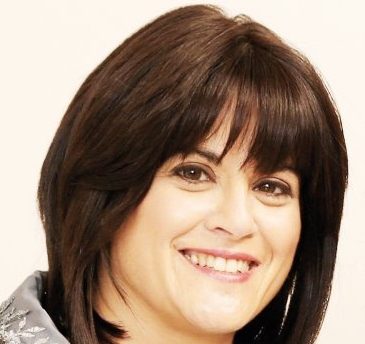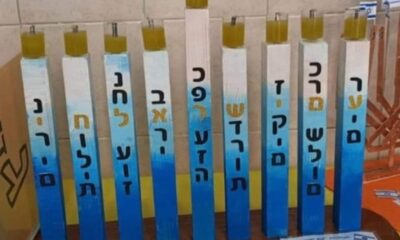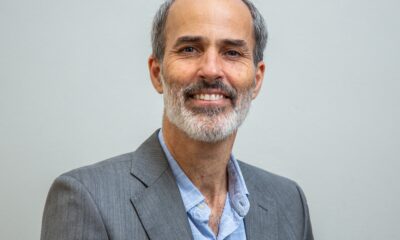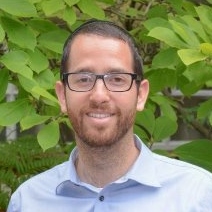
Religion

In darkest times, illuminate from the inside out
This week, Jews around the world will gather once again to commemorate the festival of Chanukah, where we celebrate the victory of the few over many and that little jar that brought the miracle of light in the midst of a dark and painful time. Interestingly, there are three main differences between the way the menorah was lit in the Temple and the way we light our menorahs today:
- The Temple menorah was lit during the day, no later than 1.15 hours before sunset, and it burned through the night. The Chanukah lights are kindled after nightfall;
- The original menorah in the Temple stood indoors, in the sanctuary of the Temple, never seen by an ordinary citizen. Its light, however, glowed outwards through the special windows of the sanctuary, which were small on the inside and wide on the outside, hence spreading the light of the menorah outwards. The Chanukah menorah, on the other hand, must be placed at the perimeter of one’s house, facing the street. Today, with the encouragement and blessing of the Lubavitcher Rebbe Menachem Mendel Schneerson, we now have public menorah lightings all over the world;
- The Temple menorah burned seven wicks. Our Chanukah menorahs have eight wicks.
Why these dissimilarities? If we’re commemorating the miracle that happened with the menorah in the Temple, surely we should re-enact the miracle?
There’s an incredibly profound lesson taught by our Chassidic masters. And it takes us back to the time of creation. In the first chapter of Genesis, we learn about the creation of light and darkness. Light symbolises revealed good, and darkness concealed good. On the most fundamental level, our task is to harness the light of day so that it extends to illuminate the night. In other words, our mission is to preserve and develop all that’s good and godly in our world, and direct these positive forces to overcome and transform the negativity of the “dark side” of creation. Hence the menorah in the Temple was lit during the day, glowing its light outwards.
But there are times when darkness overcomes the Temple, extinguishes the menorah, and defiles the oil. Times like these demand us to turn to the night as a source of light. We must search for that hidden, single cruse of pure oil and use it to illuminate the darkness around us. And so, on Chanukah, we bring the light to the streets, filling the darkness with the illumination of godly wisdom and morality. That explains the first two differences.
The third difference is, however, the most profound. The number seven in Judaism represents the natural order of things, for example the seven days of the week. The menorah in the Temple stands for the standard operating procedure of the world – the natural way to make this world a holier place. But when darkness engulfs this planet, we need to dig deeper and go beyond nature, represented by the number eight. Eight is a level above nature, a supernatural one in which we see miracles and illumination not ordinarily seen. Our Chanukah menorah stands for the fight of a few men, whose battle cry was, “Mi laHashem, elai!” (Whoever is for G-d, come with me). Their bravery, commitment, and resolve to make this world a better place and to displace the darkness earned them the miracle of Chanukah, in which one single cruse of oil burned for eight days, showing how they managed to overturn what seemingly was concealed good into a burning, bright, powerful light.
This message is so timely for us. Undoubtedly 7 October enveloped this world in a deep darkness. The senseless cruelty, barbarism, and inhumanity has certainly shocked us to our core, and in an instant, the world has been plunged into a war between good and evil, morality and immorality, light and darkness. We cannot rely on the standard operating procedure. The call of the hour is to fight this darkness by going beyond our nature, leaving our comfort zones, and illuminating every corner of this world with light – the light of Torah, mitzvot, acts of goodness and kindness, prayer, and especially the light of unity. Moreover, I would like to suggest taking it one notch higher and deeper. In each of our lives, we carry some profound darkness – a bad habit/addiction that we cannot shake; a tumultuous relationship that festers; a space of fear and anxiety that shuts us down; trauma that holds us imprisoned. The time is now to find the strength and resolve of our ancestral Maccabean brethren and become determined to change our reality.
How do we overcome these dark demons within us? By lighting the menorah of our souls, one candle at a time, increasing day by day, until we can reach full illumination. For “the soul of man is a lamp of G-d” (Proverbs 20:27). We’re literally at the precipice of history, where we have been promised the light of redemption and that we’re going to merit seeing Mashiach in our lifetimes. We all know, however, that at the same time, the darkest hours of the night are those just before dawn. We’re living this reality today. Who would ever imagine the depth of the darkness today? The message of Chanukah is loud and clear. Hashem is waiting for every one of us to rise to the occasion, to dispel our personal darkness, to reach out to our fellow in extraordinary love, and to bring this world to its final redemption. A time where we’ll merit the ingathering of all Jews to our Holy Land, the building of our third and final Temple in Jerusalem, where we’ll all bathe in Hashem’s illumination, and be blessed with ultimate peace, health, prosperity, and goodness for all mankind. Let’s gird our strength and resolve, and with the cry, “Mi laHashem, elai!” finally conquer the evil and bring the world to redemption. Chag Sameach!
- Rebbetzin Aidel Kazilsky is a radio and television host and an inspirational speaker who teaches the wisdom of Torah and applies it to contemporary times.










